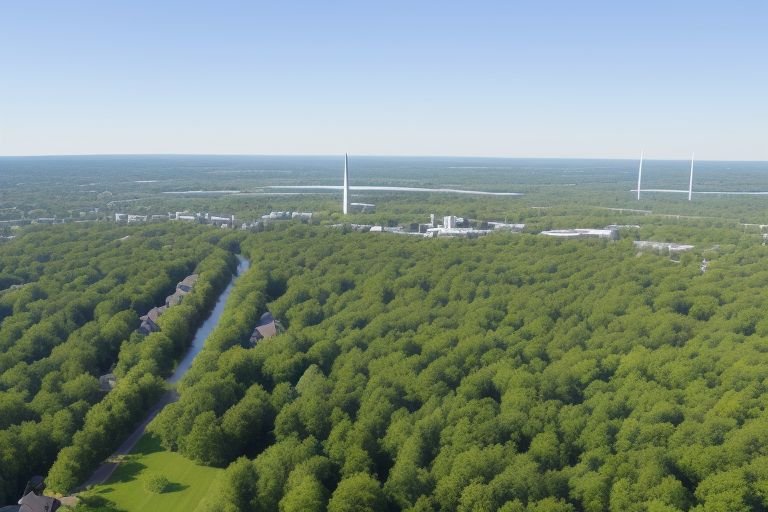
Amherst Unveils Ambitious Climate Action Plan
Amherst, a town in Massachusetts that has been identified as one of the most progressive when it comes to environmentalism, has recently advanced the war on climate change in a big way. On September 24, the Amherst Town Council approved a Climate Action Plan with an aggressive agenda to cut greenhouse gas emissions and shift to renewable energy by 2030 and 2050, respectively.
The plan, which has been under development for the past year, provides a list of specific measures that would help Amherst become carbon-neutral by 2045. This initiative position the town in the lead in the fight against global warming in the region and set an example for other municipalities that also want to respond to the calls to action in climate change.
At the heart of it is an aim to cut greenhouse gas emissions within the town by half by 2030 and effectively end emissions by 2045. In order to achieve these goals the plan outlines a comprehensive strategy which encompasses many aspects of the town, including the energy consumption in buildings, transport and waste management.
Perhaps, the most significant element of the plan is the proposed ramp up of the electrification of buildings. The town plans to electrify the heating and cooling of at least 80% of existing buildings by 2040. In order to encourage this transition, the council has recently endorsed a number of rebates and tax incentives for homeowners and businesses who change to electric systems.
Transportation is also one of the key strategies of the Climate Action Plan as mentioned above. The town has set its sights on increasing bike lanes and pedestrian ways to help decrease the use of cars. Amherst has also committed to transitioning all its municipal fleet to electric vehicles by 2035 and will be installing charging stations throughout the town to encourage the use of electric cars by the populace.
The plan also looks at renewable energy production. Amherst College has set the goal for itself to obtain 100% renewable energy by 2035. To this end, the town will be putting money into solar systems on municipal structures and promoting community solar projects. The council has also signed off on a feasibility study for a municipal wind turbine project as a means to generate a portion of Amherst’s electricity.
Another section of the plan is waste management and minimization. The town has declared that by 2030 it wants to decrease the amount of solid waste created by at least 30%, and this will be achieved through better recycling and composting, as well as better public awareness campaigns.
Educational and community involvement is incorporated into the Climate Action Plan. The town will also be working with local schools and the University of Massachusetts Amherst to create climate education curriculums and promote research on sustainable practises. He also plans to hold public hearings and meetings in order to inform the public the steps the town is taking in addressing the issue of climate change.
Many have welcomed this plan and its approval. Environmental activists have welcomed the move by Amherst as a very appropriate one, while local traders have identified business prospects in the green economy that the plan seeks to develop.
Nevertheless, the high percentage of the objectives has also brought some degree of concern as to the viability of the plan. The public concerns at this stage include the costs that are anticipated to be incurred in the process of putting them into effect particularly the building and transport changes. To this, officials have pointed out that most of the measures will result in sustainable cost reductions and that the affected citizens will be offered support in adopting the changes.
The plan’s approval occurs at a time when Amherst, like other communities, is experiencing the real effects of climate change. In the recent years, there has been rising instances of disasters such as heat waves and storm which have challenged the basic systems and facilities in the area.
Town Council President Lynn Griesemer also when talking about the plan mentioned that the waiting is over, “We can no longer afford to wait and see.” Climate change is real and it is happening within our community and around the world. This plan is our roadmap to a sustainable future, and it’s crucial that we act decisively.”
The Climate Action Plan will be administered by a new Office of Sustainability that will be in charge of the integration of the plan into town departments and the monitoring of achievement of the objectives. This committee shall report to the Town Council at least once every calendar year and to the public at large as follows.
As Amherst launches this exciting project of achieving carbon neutrality, it becomes one of the many communities in the world who are taking individual responsibilities to fight the common threat of global warming. If this plan is successful, it could be replicated in other Massachusetts towns and cities and other states.
The Climate Action Plan for Amherst can be viewed as the successful step that reflects the concern of the town towards the environment and its willingness to tackle the climate change issue. When the implementation phase starts, everybody will be watching Amherst, a small New England town, to see how it will manage the challenge of becoming sustainable.
Amherst has presented a concrete set of goals, creative measures and a clear plan to involve the community in its Climate Action Plan, thus responding to one of the biggest problems of the contemporary world. The town is still slowly implementing the agreement and gives the world a ray of light and the possibilities of local action in combating climate change.